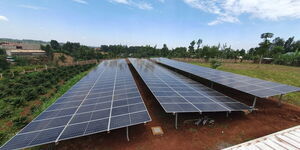The US Consumer Product Safety Commission (CPSC) has recalled over 100,000 pairs of jeans made in Kenya for babies and distributed at retail outlets in the North American nation.
According to CPSC, the pairs of jeans meant for babies are dangerous and hazardous to the wearers due to some faulty features that happened during manufacturing.
The clothing items are said to have metal snaps that could potentially fall off and choke babies and toddlers.
In response to the identified safety concerns, retail outlets have been instructed to reach out to the parents who purchased the items and facilitate the return process.
Among the 100,000 pieces, 97,400 were sold in the US, and 1,800 were sold in Canada, with each pair going for about Ksh3,600 (USD25).
Clothes exported to the US are manufactured at garment companies operating in the Export Processing Zones (EPZ) in Nairobi and Machakos counties.
The clothes are exported under the African Growth and Opportunity Act (AGOA) arrangements that give garment manufacturers in Africa preferential access to the US market.
According to CPSC, the clothes recalled were sold exclusively at the local store from September 2022 to March 2023.
However, the parents were incentivised with full refunds as retail stores took responsibility for the losses incurred.
The decision to recall the products was prompted by a specific incident where a snap detached from one of the items, but luckily no injuries were reported.
In Canada, the Canada Consumer Product Safety Act has prohibited recalled items from being redistributed, sold, or even given away, as it could potentially damage the reputation of the country.
The Kenyan textile export market under the AGOA is one of the biggest on the continent, employing thousands in EPZs operating in Athi River, Machakos County, and Nairobi's Ruaraka area.
Trade Cabinet Secretary Moses Kuria has expressed confidence in its growth with the push for a free-trade agreement with the US ahead of the expiry of the AGOA deal in 2025.
Kuria has also promised to promote local garment production by increasing taxes on imported clothes, especially second-hand garments, popularly known as mitumba.
Research conducted in 2022 revealed that only five percent of Kenyans buy locally-made clothes with many pointing out that the cost was a major factor.
A significant contributor to driving up costs is expensive raw materials including cotton which the country imports.












